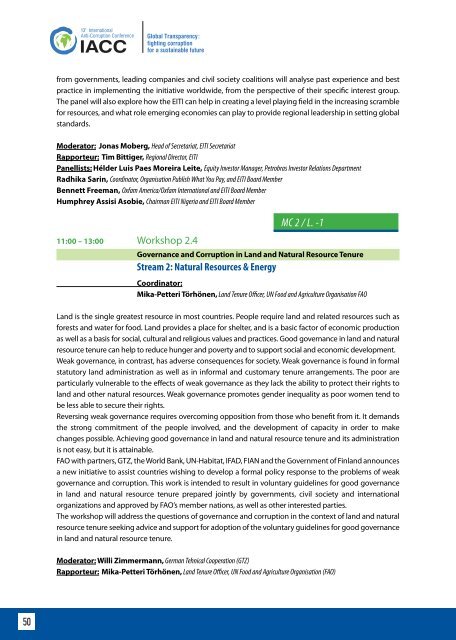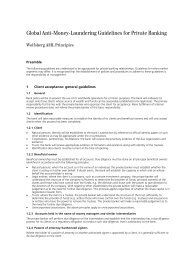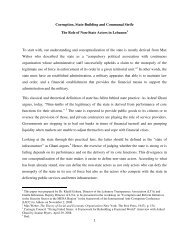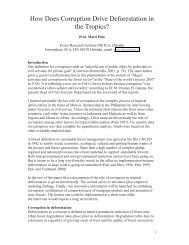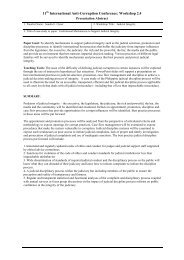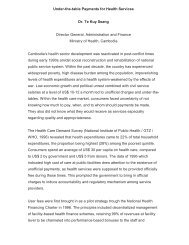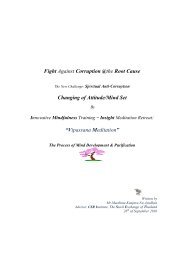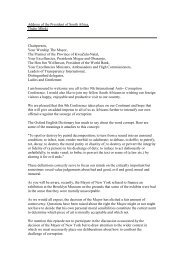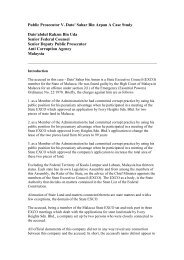Final Programme - 13th International Anti-Corruption Conference
Final Programme - 13th International Anti-Corruption Conference
Final Programme - 13th International Anti-Corruption Conference
You also want an ePaper? Increase the reach of your titles
YUMPU automatically turns print PDFs into web optimized ePapers that Google loves.
from governments, leading companies and civil society coalitions will analyse past experience and bestpractice in implementing the initiative worldwide, from the perspective of their specific interest group.The panel will also explore how the EITI can help in creating a level playing field in the increasing scramblefor resources, and what role emerging economies can play to provide regional leadership in setting globalstandards.Moderator: Jonas Moberg, Head of Secretariat, EITI SecretariatRapporteur: Tim Bittiger, Regional Director, EITIPanellists: Hélder Luis Paes Moreira Leite, Equity Investor Manager, Petrobras Investor Relations DepartmentRadhika Sarin, Coordinator, Organisation Publish What You Pay, and EITI Board MemberBennett Freeman, Oxfam America/Oxfam <strong>International</strong> and EITI Board MemberHumphrey Assisi Asobie, Chairman EITI Nigeria and EITI Board Member11:00 – 13:00 Workshop 2.4MC 2 / L. -1Governance and <strong>Corruption</strong> in Land and Natural Resource TenureStream 2: Natural Resources & EnergyCoordinator:Mika-Petteri Törhönen, Land Tenure Officer, UN Food and Agriculture Organisation FAOLand is the single greatest resource in most countries. People require land and related resources such asforests and water for food. Land provides a place for shelter, and is a basic factor of economic productionas well as a basis for social, cultural and religious values and practices. Good governance in land and naturalresource tenure can help to reduce hunger and poverty and to support social and economic development.Weak governance, in contrast, has adverse consequences for society. Weak governance is found in formalstatutory land administration as well as in informal and customary tenure arrangements. The poor areparticularly vulnerable to the effects of weak governance as they lack the ability to protect their rights toland and other natural resources. Weak governance promotes gender inequality as poor women tend tobe less able to secure their rights.Reversing weak governance requires overcoming opposition from those who benefit from it. It demandsthe strong commitment of the people involved, and the development of capacity in order to makechanges possible. Achieving good governance in land and natural resource tenure and its administrationis not easy, but it is attainable.FAO with partners, GTZ, the World Bank, UN-Habitat, IFAD, FIAN and the Government of Finland announcesa new initiative to assist countries wishing to develop a formal policy response to the problems of weakgovernance and corruption. This work is intended to result in voluntary guidelines for good governancein land and natural resource tenure prepared jointly by governments, civil society and internationalorganizations and approved by FAO’s member nations, as well as other interested parties.The workshop will address the questions of governance and corruption in the context of land and naturalresource tenure seeking advice and support for adoption of the voluntary guidelines for good governancein land and natural resource tenure.Moderator: Willi Zimmermann, German Tehnical Cooperation (GTZ)Rapporteur: Mika-Petteri Törhönen, Land Tenure Officer, UN Food and Agriculture Organisation (FAO)50


